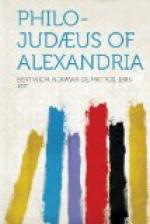* * * * *
VII
PHILO AND JEWISH TRADITION
We have seen from time to time how Philo’s interpretation of the Bible corresponds with Palestinian Jewish tradition; and we must now consider more in detail the relations of the two schools of Jewish learning. Until the last century it was commonly supposed that no close relation existed, and that the Alexandrian and Palestinian schools were independent and opposed; Scaliger, the greatest scholar of the seventeenth century, wrote[280] that “Philo was more ignorant of Hebraic and Aramaic lore than any Gaul or Scythian,” and this was the opinion generally held. The researches of Freudenthal and Siegfried[281] have shown the falsity of these views; and, most important of all, Philo refutes them out of his own mouth. He refers in many different parts of his works[282] to the tradition and the wisdom of his ancestors, he tells us how on the Sabbath the Jews studied in their synagogues their special philosophy,[283] and he commences his “Life of Moses” by declaring that against the false calumnies of Greek writers he will set forth the true account which he has learnt from the sacred writings and “from certain elders of his race.” In support of his statement we have the remark of Eusebius, the Christian historian, and our chief ancient authority for Philo’s work,[284] that he set forth and expounded not only the laws of the Bible, but many institutions and opinions of his fathers. Apart from these direct references, the numerous points of correspondence between Philo’s interpretations and those of the Talmud and later Midrash would compel us to admit a connection between Alexandria and Jerusalem.
The break between the two schools did not show itself till after the time of Philo. Up to the first century of the Christian era the rabbis encouraged the union of Shem and Japheth—the two good sons of one parent—and the stream of ideas flowed quite freely between the teachers in Palestine and the Hellenized colony in Egypt.[285] Hence the Palestinian Jews, on the one hand, received the first fruits of this mingling of cultures, and the Alexandrian Jews, on the other, must have inherited the early tradition of the rabbinical interpreters embodied in ancient Halakah and Haggadah. By this common heritage, rather than by any direct borrowing, it




